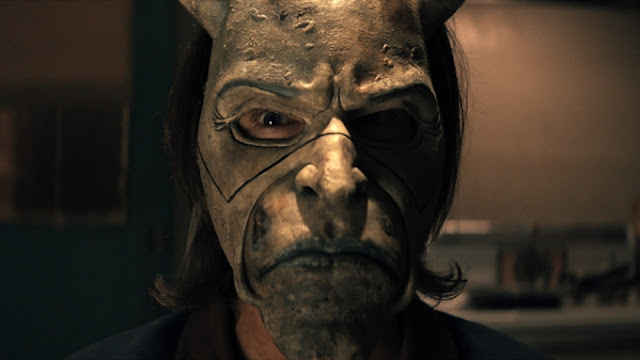The Black Phone: Movie Review
Cast: Ethan Hawke, Mason Thames, Madeleine McGraw, Jeremy Davies
Director: Scott Derrickson
Reteaming with his Sinister director, Ethan Hawke makes a case for one of the year's most chilling villains in The Black Phone.
Based on the short story by Joe Hill, The Black Phone is set in 1970s Denver, at a time when children are going missing, but other children roam the streets enjoying a hazy summer vibe.
As the police hunt the Grabber (Hawke, chilling and primal), missing posters litter Denver, and fear hangs in the air. For Mason Thomas' Finney, it's a time of unease - sandwiched between school bullies and violent outbursts from his drunken abusive father (Davies), as well as that first crush at school.
When some of Finney's friends go missing, his sister Gwen (McGraw, playing a take no prisoners character) and he worry they could be next - and Finney's fears are realised when he's abducted. Waking in a basement, he realises he has limited time to get away from the Grabber...
The Black Phone is a remarkably effective film for seizing on something primal and extending it out as far as it can go.
Not only does the Grabber work as a villain thanks to a lack of backstory and any real diversion into motives or psychological make-up, but by giving Finney and his pals a past and the time to explore them early on, Derrickson manages to make the suspense almost unbearable in parts.
But Derrickson isn't just interested in conveying the horrors in the basement - he takes time to reveal, but never revel, in Finney and Gwen's horrors at home. With Gwen seemingly displaying the same foresight that her mother had, she's a target for both her father's fears and angry grief over his wife's fate - but rather than making Gwen a victim, Derrickson and McGraw make her a figure of resilience and one that Finney ultimately draws strength from.
While the youngsters are terrific, Hawke is equally impressive in a role that requires both theatricality and vocal intonations as he works from behind a mask. The slightest change in speech patterns make Hawke's Grabber go from vaguely sympathetic to utterly terrifying within moments. Using the same kind of ethos that made the initial outing for the Shape so frightening in Halloween, Derrickson et al would be wise to ensure no sequels or prequels are made that fashion the Grabber into some kind of tragic figure. Here, he's all the more frightening for what we don't know.
Ultimately, The Black Phone works because of well-orchestrated atmospherics, as well as some momentary comedic business. Mixing thriller with horror and supernatural elements prove to be a masterstroke in discomfort throughout - but not once does The Black Phone dial up anything less than a disturbing and suspenseful outing that's certainly worth viewing.





%20&%20Edith%20Poor%20(Lizzie%20Moyle)_%C2%A9BBCS%20&%20Bunya%20Entertainment.jpg)
No comments:
Post a Comment